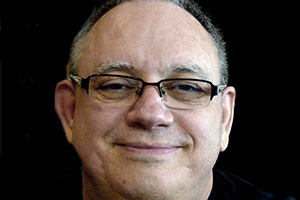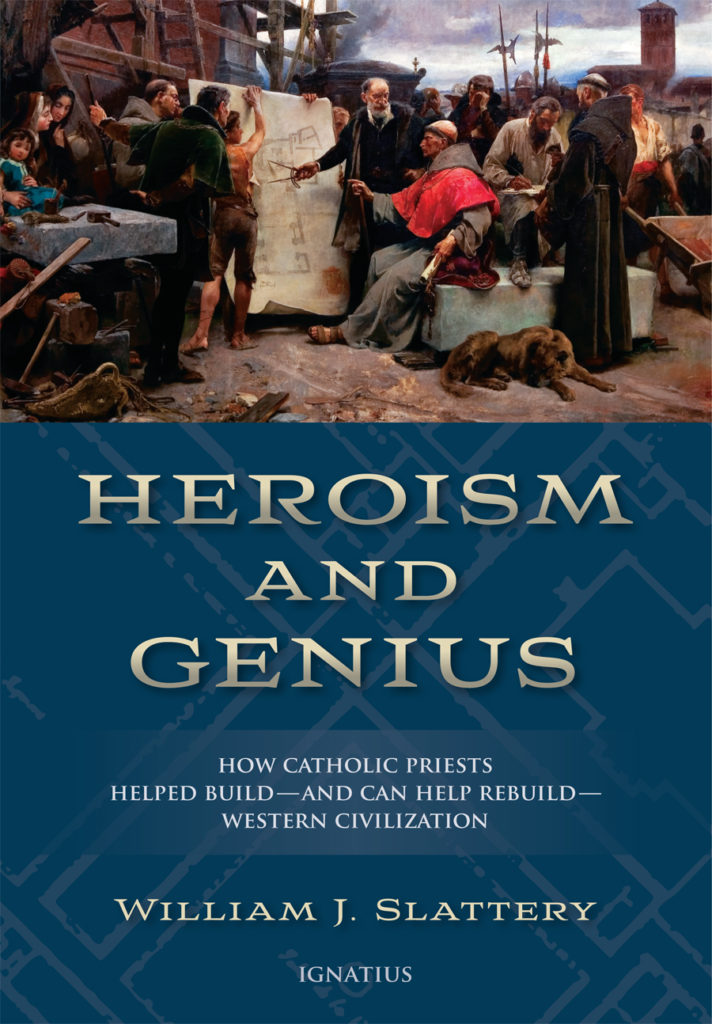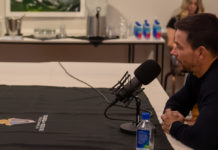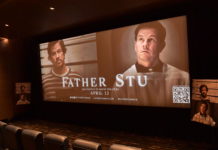
‘Heroism & Genius’
Author: Fr. William J. Slattery
Publisher: Ignatius
Length: 292 pages
Release Date: Nov. 23, 2017
Available at: Kino Library
If we watch the news, watch talk shows, or read the internet happenings, we find great, abiding cynicism, profound cynicism. As postmodernism erupts into a full-blown worldview with its relativism and deliberate secularization, we find Christianity and, indeed, our Catholic faith under an almost institutionalized attack. It’s “bad” to believe in absolute truth; it’s “wrong” to hand your freedom over to an old institution like the Church.
And then, like a splash of very cold water in the face, Fr. William J. Slattery steps up with a new book, “Heroism and Genius: How Catholic priests helped build — and can help rebuild — Western Civilization.”
I had to laugh at the title because it sounds so obtuse, until you begin reading. I cannot recall another title that goes from the proverbial “zero to 60” at the speed of light. And most importantly, Fr. Slattery is serious.
And, he’s absolutely right.
Everywhere we look in history — at the moments of peopling governments, to the moments of scientific breakthrough, to the moments of building great buildings, to the moments of conquest, Catholic priests are there, applying reason, seeking the rare truths of God’s creation and demanding justice for the whole indigenous world.
It’s awesome and profound and feels like cheerleading in the big games.
Fr. Slattery takes us right through history, from Rome to the present day, without a single stop or a single breath of cynicism.

Take the early days: circa AD 200-1300. Rome prospered, Rome collapsed, emperors came and went and Constantine declared Christianity the real deal. Priests took the Word to all of Europe, up into Scandinavia, and the Celtic lands. If kings ruled, it was because they were ordained by the Church to do so.
Priests worked among the governments in Europe, always nudging them toward the fulfillment of human dignity and freedom. Great leaders like Charlemagne united several parts of Western Europe and he was motivated by God, his position given by God, and the Church with priests abounding.
Priests formed a monastic order of chivalry, the Knights Templar, which dedicated itself to the protection of the Church leading several of the crusades. Some religious orders formed in spiritual chivalry, the Dominicans for one, who sought to be the watchdogs of the Church and its orthodoxy. Some of the orders formed democratic governments which became the precursors of secular governments that followed.
Priests became the great artists, musicians, even scientists, always on the forefront of human development, always seeking to reveal God’s creation. Fra Angelico, a Dominican, was a great painter. Vivaldi — the “Red Priest” — became one of history’s greatest composers. Copernicus in the 16th century and, in the 20th century, Georges Lemaître were great astronomers. Lemaître was credited with theorizing the Big Bang.
In the 16th century, priests worked out free market economies from the moral values of individual human dignity. Albert, the Great and Thomas Aquinas wrote about individual property rights as an expression of human dignity.
In 2002, at the state-controlled Chinese Academy of Social Sciences in Beijing, China, an intellectual addressed a group of 18 Americans. He said that the academy studied everything that the West did, everything that made us great. He said that the Chinese thought that they had a better political system but when it came to the economic system, nothing could touch us. He said that the scientists finally realized the foundation of our political and economic power, at the heart of our culture, was our Christianity, our religious principles deeply imbedded in the fabric of the culture. Of course, the man did not want his name used in any reprint of comments.
It makes one wonder what the Chinese know that American postmodern secularists seeking to undermine our values don’t; probably just the objective truth.
All of this merely scratches the surface of what priests have done for Western civilization. What priests can do for us today is lead us right back down that same path, reminding us again and again that God made us who we are and that if we want to go it alone — like secular humanists — we don’t stand a chance.
To say that this is marvelous reading is a sinful understatement; to say that it is eminently readable is just a fact. Read this book and next Sunday go stare at your parish priest — he comes from a long line of the ultimate shakers and makers of our world.






